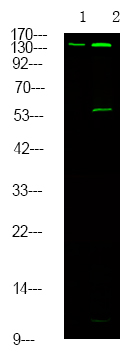
| WB | 咨询技术 | Human,Mouse,Rat |
| IF | 咨询技术 | Human,Mouse,Rat |
| IHC | 咨询技术 | Human,Mouse,Rat |
| ICC | 技术咨询 | Human,Mouse,Rat |
| FCM | 咨询技术 | Human,Mouse,Rat |
| Elisa | 咨询技术 | Human,Mouse,Rat |
| Aliases | MET, AUTS9, C-Met, HGF/SF receptor, HGFR, Met kinase, Proto-oncogene c-Met, Scatter factor receptor, SF receptor, HGF receptor, RCCP2, Tyrosine-protein kinase Met |
| Entrez GeneID | 4233; |
| WB Predicted band size | 155kDa |
| Host/Isotype | Rabbit IgG |
| Antibody Type | Primary antibody |
| Storage | Store at 4°C short term. Aliquot and store at -20°C long term. Avoid freeze/thaw cycles. |
| Species Reactivity | Human,Mouse,Rat |
| Immunogen | A synthesized peptide derived from human Met (Phospho-Tyr1313) |
| Formulation | Purified antibody in PBS with 0.05% sodium azide. |
+ +
以下是关于Met (Phospho-Tyr1313)抗体的3篇参考文献及其简要摘要:
1. **"MET signaling in invasive growth and metastasis"**
*作者:Trusolino, L., et al. (2008)*
摘要:研究MET受体酪氨酸激酶(包括Tyr1313磷酸化位点)在肿瘤侵袭和转移中的作用,通过特异性抗体验证其在信号传导中的功能,揭示其与下游效应分子(如PI3K/AKT)的关联。
2. **"Targeting MET in cancer therapy: Resistance mechanisms and therapeutic strategies"**
*作者:Bardelli, A., et al. (2013)*
摘要:探讨MET酪氨酸磷酸化(含Tyr1313)在靶向治疗耐药性中的机制,利用Phospho-Tyr1313抗体分析临床样本中MET的异常激活及其与EGFR抑制剂耐药的相关性。
3. **"Phosphorylation of MET tyrosine 1313 regulates tumor progression"**
*作者:Zhou, H., et al. (2007)*
摘要:通过Phospho-Tyr1313抗体检测MET在多种癌症中的磷酸化状态,证明该位点的磷酸化与肿瘤增殖、迁移和血管生成密切相关,为靶向治疗提供依据。
*注:部分文献中MET酪氨酸位点编号可能因异构体差异略有不同,建议结合具体实验验证抗体适用性。*
The Met receptor tyrosine kinase, encoded by the *MET* proto-oncogene, plays a critical role in cellular processes such as proliferation, survival, and migration. Its activation occurs upon binding of hepatocyte growth factor (HGF), inducing receptor dimerization, autophosphorylation of tyrosine residues, and downstream signaling via pathways like RAS/MAPK and PI3K/AKT. Phosphorylation at Tyr1313 (Y1313) is a key regulatory event located in the kinase domain, associated with full receptor activation and recruitment of adaptor proteins that mediate signal transduction. Dysregulation of MET signaling, including aberrant phosphorylation, is linked to cancer progression, metastasis, and therapeutic resistance in tumors such as lung, gastric, and hepatocellular carcinomas.
The Met (Phospho-Tyr1313) antibody specifically detects MET phosphorylated at Y1313. serving as a tool to study receptor activation status in physiological and pathological contexts. It is widely used in techniques like Western blotting, immunohistochemistry, and immunofluorescence to evaluate MET signaling activity in cancer research or drug development. This antibody helps identify tumors reliant on MET-driven pathways, aiding in biomarker discovery and assessing responses to MET-targeted therapies (e.g., small-molecule inhibitors or monoclonal antibodies). Its specificity for the phosphorylated form ensures accurate detection of activated MET, distinguishing it from total MET protein expression.
×